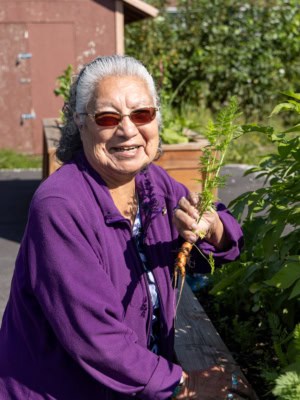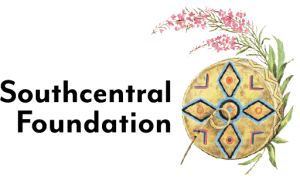Healthy Eating for Aging Well
By Southcentral Foundation Corporate Communications

Myrtle Van Dorn harvests fresh vegetables from the SCF Elder Program Wellness Garden.
As we age, our health needs evolve and change with time. Nutrient requirements also shift at each stage of life. Eating healthy is a foundational component of aging well and influences a person’s ability to maintain mobility, energy, and strength.
“A healthy diet is among the controllable elements that can help deter age-related illnesses and maintain general well-being as we grow older,” Southcentral Foundation Registered Dietitian Keriann Shine shared.
Maintaining a diet that includes balanced meals and nutritious foods increases an Elder’s ability to continue to participate in most everyday activities.
Being mindful of the physiological shifts that occur as we age allows individuals to adapt their lifestyles and habits according to their individual abilities and goals. The body naturally changes in composition, resulting in a decrease of muscle and an increase in fat tissue over time. Sensory changes impact smells and tastes and tend to decrease as we get older. Appetite decreases and eating smaller portions to feel satiated is a common occurrence. The general absorption of nutrients also decreases. All of these changes can initiate a decline in getting the basic vitamins and minerals necessary to maintain energy levels.
Focus on these four quality nutrients to preserve overall good health.
- Protein is vital to help keep Elders strong. Traditional foods including salmon, caribou, moose, shellfish, whale, and seal are excellent sources of protein.
- Vitamin D supplements of at least 800 IU daily can help maintain bone strength in conjunction with calcium-rich traditional greens, including dandelion, stinging nettles, and currants.
- B vitamins are known to maintain energy levels and are abundant in most fruits and vegetables.
- Water keeps you hydrated. The dietary recommendation is to aim for at least six and a half cups per day to stay hydrated, assisting in the further breakdown of vitamins and increasing nutrient absorption.
Aging well can mean many things to different people, and being informed is a great way for Elders to achieve wellness in all aspects.
For more information about how to connect with a dietitian, call your primary care provider or the Elder Program at 907-729-6500.


